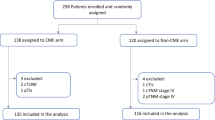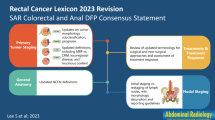Abstract
Background
The standard approach for locally advanced rectal cancer (LARC) is neoadjuvant chemoradiotherapy (nCRT) followed by total mesorectal excision (TME). After nCRT 20% of patients achieve a clinical complete response (pCR) and could be treated with a non-operative management (NOM).
Methods
The panel of the Italian Association of Medical Oncology (AIOM) Guidelines on rectal cancer applied the Grading of Recommendations, Assessment, Development and Evaluation (GRADE) approach addressing the following question: Should NOM vs. TME be used for patients with rectal cancer with clinical complete response after nCRT? Five outcomes were identified: disease-free survival (DFS), mortality, local recurrence, colostomy rate, and functional outcomes.
Results
Nine studies were included in the analysis. A higher risk of disease recurrence was observed in the NOM group compared to the TME group (RR = 1.69, 95% CI 1.08, 2.64) on the other hand, we observed a slightly positive but not significant effect on mortality of NOM (RR = 0.82, 95% CI 0.46, 1.45). Patients in the NOM group were more likely to experience local recurrence (RR = 5.37, 95% CI 2.56, 11.27) and patients in the TME group were more likely to have a permanent colostomy (RR = 0.15, 95% CI 0.08, 0.29). Only one study evaluated functional outcomes. The overall certainty of evidence was rated as very low.
Conclusions
NOM was found to correlate with a higher risk of local recurrence which did not translate in worse OS and a lower colostomy rate. Due to the paucity of evidences, no recommendations are possible. NOM remains an experimental treatment; thus, patients managed with NOM should be enrolled in clinical trials with a dedicated follow-up schedule.



Similar content being viewed by others
References
Siegel RL, Miller KD, Jemal A. Cancer statistics, 2018. CA: a cancer journal for clinicians. 2018;68(1):7-30.
Smith JA. Possible venous air embolism with a new water jet dissector. British journal of anaesthesia. 1993;70(4):466-467.
Sauer R, Becker H, Hohenberger W, et al. Preoperative versus postoperative chemoradiotherapy for rectal cancer. The New England journal of medicine. 2004;351(17):1731-1740.
Kapiteijn E, Marijnen CA, Nagtegaal ID, et al. Preoperative radiotherapy combined with total mesorectal excision for resectable rectal cancer. The New England journal of medicine. 2001;345(9):638-646.
Lutz MP, Zalcberg JR, Glynne-Jones R, et al. Second St. Gallen European Organisation for Research and Treatment of Cancer Gastrointestinal Cancer Conference: consensus recommendations on controversial issues in the primary treatment of rectal cancer. European journal of cancer. 2016;63:11-24.
Pucciarelli S, Del Bianco P, Efficace F, et al. Patient-reported outcomes after neoadjuvant chemoradiotherapy for rectal cancer: a multicenter prospective observational study. Annals of surgery. 2011;253(1):71-77.
Habr-Gama A, Perez RO, Nadalin W, et al. Operative versus nonoperative treatment for stage 0 distal rectal cancer following chemoradiation therapy: long-term results. Annals of surgery. 2004;240(4):711-717; discussion 717-718.
Li J, Li L, Yang L, et al. Wait-and-see treatment strategies for rectal cancer patients with clinical complete response after neoadjuvant chemoradiotherapy: a systematic review and meta-analysis. Oncotarget. 2016;7(28):44857-44870.
Araujo RO, Valadao M, Borges D, et al. Nonoperative management of rectal cancer after chemoradiation opposed to resection after complete clinical response. A comparative study. European journal of surgical oncology : the journal of the European Society of Surgical Oncology and the British Association of Surgical Oncology. 2015;41(11):1456-1463.
Smith RK, Fry RD, Mahmoud NN, Paulson EC. Surveillance after neoadjuvant therapy in advanced rectal cancer with complete clinical response can have comparable outcomes to total mesorectal excision. International journal of colorectal disease. 2015;30(6):769-774.
Lee SY, Kim CH, Kim YJ, Kim HR. Oncologic Outcomes according to the Treatment Strategy in Radiologic Complete Responders after Neoadjuvant Chemoradiation for Rectal Cancer. Oncology. 2015;89(6):311-318.
Guyatt GH, Oxman AD, Schunemann HJ, Tugwell P, Knottnerus A. GRADE guidelines: a new series of articles in the Journal of Clinical Epidemiology. Journal of clinical epidemiology. 2011;64(4):380-382.
Austin TM, Richter RR, Sebelski CA. Introduction to the GRADE approach for guideline development: considerations for physical therapist practice. Phys Ther. 2014;94(11):1652-1659.
Lai CL, Lai MJ, Wu CC, Jao SW, Hsiao CW. Rectal cancer with complete clinical response after neoadjuvant chemoradiotherapy, surgery, or “watch and wait”. International journal of colorectal disease. 2016;31(2):413-419.
Alonso-Coello P, Oxman AD, Moberg J, et al. GRADE Evidence to Decision (EtD) frameworks: a systematic and transparent approach to making well informed healthcare choices. 2: Clinical practice guidelines. BMJ. 2016;353:i2089.
Smith JD, Ruby JA, Goodman KA, et al. Nonoperative management of rectal cancer with complete clinical response after neoadjuvant therapy. Annals of surgery. 2012;256(6):965-972.
Maas M, Beets-Tan RG, Lambregts DM, et al. Wait-and-see policy for clinical complete responders after chemoradiation for rectal cancer. Journal of clinical oncology : official journal of the American Society of Clinical Oncology. 2011;29(35):4633-4640.
Ayloor Seshadri R, Kondaveeti SS, Jayanand SB, et al. Complete clinical response to neoadjuvant chemoradiation in rectal cancers: can surgery be avoided? Hepato-gastroenterology. 2013;60(123):410-414.
Dalton RS, Velineni R, Osborne ME, et al. A single-centre experience of chemoradiotherapy for rectal cancer: is there potential for nonoperative management? Colorectal disease : the official journal of the Association of Coloproctology of Great Britain and Ireland. 2012;14(5):567-571.
Jorge JM, Wexner SD. Etiology and management of fecal incontinence. Diseases of the colon and rectum. 1993;36(1):77-97.
Temple LK, Bacik J, Savatta SG, et al. The development of a validated instrument to evaluate bowel function after sphincter-preserving surgery for rectal cancer. Diseases of the colon and rectum. 2005;48(7):1353-1365.
Dattani M, Heald RJ, Goussous G, et al. Oncological and Survival Outcomes in Watch and Wait Patients With a Clinical Complete Response After Neoadjuvant Chemoradiotherapy for Rectal Cancer: A Systematic Review and Pooled Analysis. Annals of surgery. 2018;268(6):955-967.
Appelt AL, Ploen J, Harling H, et al. High-dose chemoradiotherapy and watchful waiting for distal rectal cancer: a prospective observational study. The lancet oncology. 2015;16(8):919-927.
van der Valk MJM, Hilling DE, Bastiaannet E, et al. Long-term outcomes of clinical complete responders after neoadjuvant treatment for rectal cancer in the International Watch & Wait Database (IWWD): an international multicentre registry study. Lancet. 2018;391(10139):2537-2545.
Al-Sukhni E, Attwood K, Mattson DM, Gabriel E, Nurkin SJ. Predictors of Pathologic Complete Response Following Neoadjuvant Chemoradiotherapy for Rectal Cancer. Annals of surgical oncology. 2016;23(4):1177-1186.
Author information
Authors and Affiliations
Corresponding author
Ethics declarations
Conflict of Interest
The authors declare that they have no conflict of interest.
Additional information
Publisher’s Note
Springer Nature remains neutral with regard to jurisdictional claims in published maps and institutional affiliations.
Electronic supplementary material
ESM 1
(DOC 103 kb)
Rights and permissions
About this article
Cite this article
Capelli, G., De Simone, I., Spolverato, G. et al. Non-Operative Management Versus Total Mesorectal Excision for Locally Advanced Rectal Cancer with Clinical Complete Response After Neoadjuvant Chemoradiotherapy: a GRADE Approach by the Rectal Cancer Guidelines Writing Group of the Italian Association of Medical Oncology (AIOM). J Gastrointest Surg 24, 2150–2159 (2020). https://doi.org/10.1007/s11605-020-04635-1
Received:
Accepted:
Published:
Issue Date:
DOI: https://doi.org/10.1007/s11605-020-04635-1




